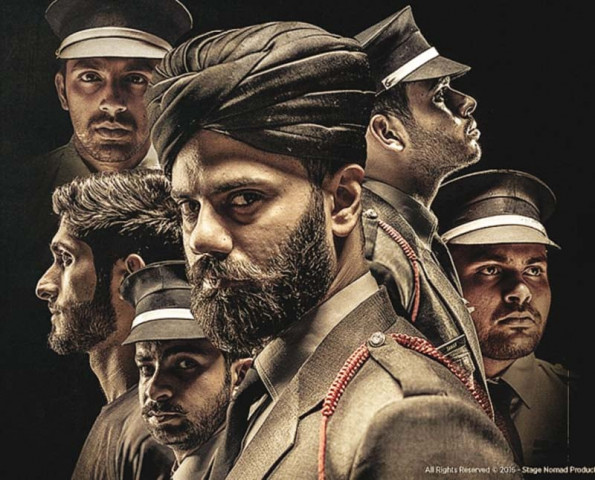The trial and error of ‘Court Martial'
Student-run troupe aims to enable theatre, empower underprivileged performers in Pakistan.

Court Martial was written by Indian playwright Swadesh Deepak. PHOTO: PUBLICITY
In Pakistan, the marriage of theatre and activism has been a strange one. Groups such as Tehrik-e-Niswan may have existed for decades, but their bottom-of-the-line production quality and stage aesthetics have reinforced the cliched Bollywood line, “Ye shadi nahin hosakti!”
However, in October 2015, two Institute of Business Administration, Karachi (IBA) graduates quit their corporate aspirations to form a theatre troupe comprising students only. Called Stage Nomad Productions, the company aims to enable the underprivileged through performing arts. As co-founders Saad Qazi and Irfan Anwar sit for an interview with The Express Tribune, cast and crew rehearse their upcoming production, Court Martial, inside the National Academy of Performing Arts (Napa).
Rawalpindi-born Swadesh Deepak, one of the most appreciated modern Indian playwrights, wrote the play in 1991. The Kubrickesque courtroom drama has been staged thousands of times across the border and can rightfully be called Deepak’s magnum opus. The Kay Kay Menon-starrer Shaurya was partly inspired by the play.
Stage set for International Theatre Festival at NAPA
Saad feels Court Martial is quite relevant to contemporary Pakistan. “It basically highlights class prejudice in a military setting. Today, your last name and pocket size define a lot of things for you.” Considering the sensitivity of the subject, the team has made a number of modifications in the script. “Our army is neither Indian nor Pakistani. Although Indian surnames are still there because they are essential to the class struggle that the play is talking about, we have changed a few things. For instance, instead of saying Indian Penal Code we say National Penal Code,” he explains.
Beginning to expand on the storyline, he adds, “Basically a lower caste sepoy Ram Chander guns down an officer and faces trial in the court of Colonel Surat Singh. Although Ram has pled guilty, defence counsel Captain Bikash Roy still fights his case.”
Swadesh’s son Sukant, who is also a writer, was surprised to hear the popularity of his father’s work in Pakistan. “He was so happy to hear that students are staging it here. He has approved the changes that we’ve made and is even motivated to come and watch. We are currently looking for financial help in this regard,” Irfan says.
The Stage Nomad team has been working together for four years now, putting together college-level performances of plays such as Kuttey, Anji and Juloos. For them, Court Martial is a litmus test. “We want to become enablers of theatre. In Pakistan, children are forced to prise themselves out of their dreams. If our play becomes a success, we will take it to Lahore and Islamabad after Ramazan,” he adds.
The proceeds of Court Martial will fund recruitment drives of underprivileged performers and also the setting up of an arts centre. While these claims may seem too tall for amateur theatre activists, they believe one has to start somewhere. “We want to create inclusivity for those on the streets. What is the reason that shows across the road [Arts Council Karachi] do well as compared to those over here [Napa]?” Saad asks. While he credits groups such as Kopykat Productions for increasing awareness about theatre, he feels a lot more needs to be done. “Theatre is all about showing the true face of society. That is not happening anymore. All we have left is food festivals and tea festivals.”
Contrary to their rather pretentious claims, one may not exactly find performers of underprivileged backgrounds in Court Martial. In their defence, Saad says. “Our timeframe and resources are limited. We worked under the guidance of Dr Ishrat [Husain] and learnt one thing from him; you cannot achieve everything in one stride.” Irfan pitches in, “You see if we get people on board right now, they will have to leave their day jobs and we will have to arrange for compensation which at the moment we cannot.”
Paying tribute: NAPA to stage Kamal Ahmed Rizvi’s ‘Khoya Hua Admi’
Saad maintains whoever approached them, was made part of the production. “This morning a boy wrote on our Facebook page that he wants a chance. Right now he is rehearsing with the cast. Passion is our only criterion,” he says. “Our actors belong to IBA, KU, Szabist … not all IBA students are privileged,” lead actor Hammad Ather Mehmood intervenes.
Napa alumnus Sunil Shanker is directing the play. As he punishes a cast member in the background for not being able to articulate his lines properly, Saad says, “Napa is supporting us. They have provided us the script and a place to practice.”
With a runtime of 100 minutes and ticket price of Rs1,000, Court Martial runs at the FTC Auditorium, Karachi at 7:30pm, everyday, from March 18 to March 31. For tickets, contact: 03212910210.
Published in The Express Tribune, March 15th, 2016.
Like Life & Style on Facebook, follow @ETLifeandStyle on Twitter for the latest in fashion, gossip and entertainment.



















COMMENTS
Comments are moderated and generally will be posted if they are on-topic and not abusive.
For more information, please see our Comments FAQ